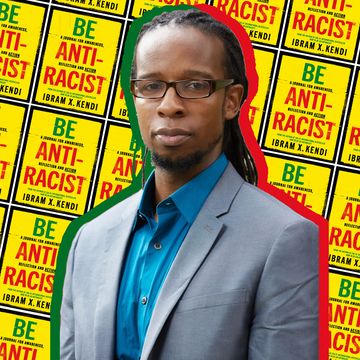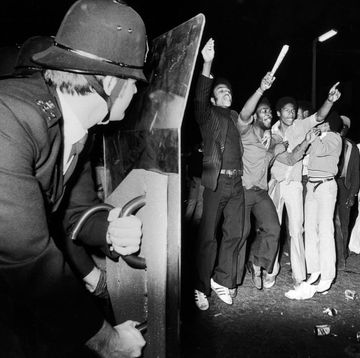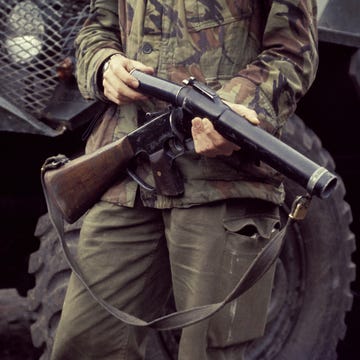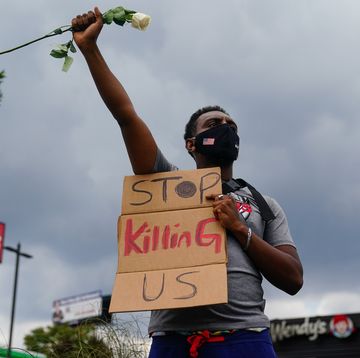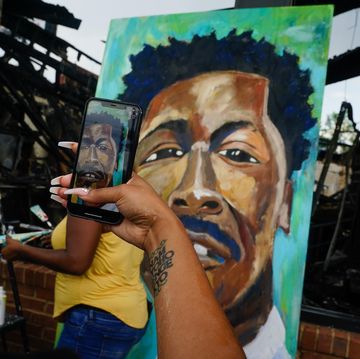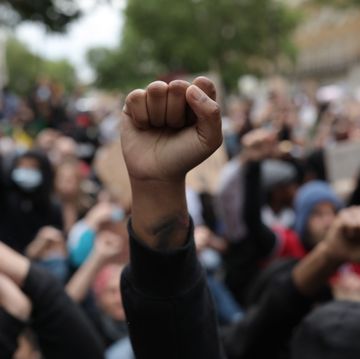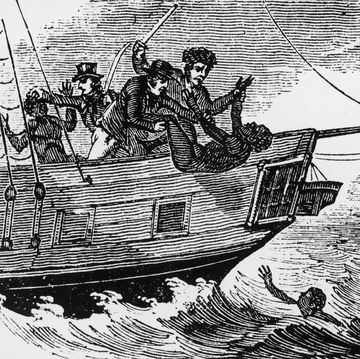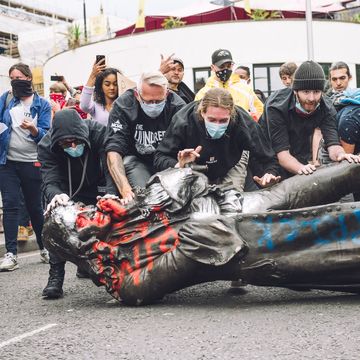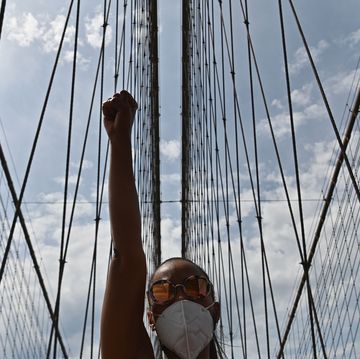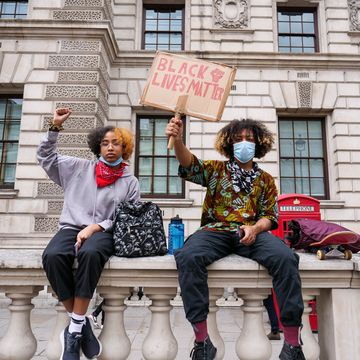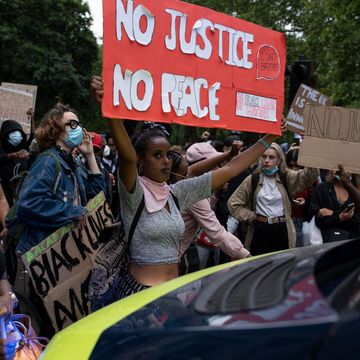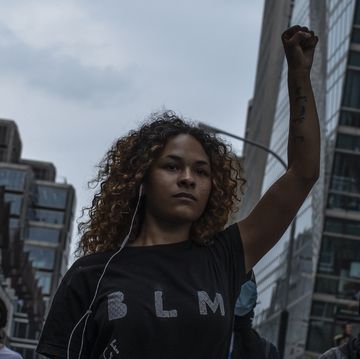Marsha de Cordova, shadow women's and equalities secretary and Labour MP for Battersea, has been getting a lot of emails.
"Obviously I had loads during Brexit, hundreds and hundreds and hundreds," she says over Zoom. "This is on that level, if not more."
The outpouring of support and solidarity for the Black Lives Matter cause, for George Floyd, and for an unsparing reappraisal of the way Britain teaches its own history has been startling. "These aren’t from people that always write to their MP – these are from constituents that are getting in touch for the first time, and I think that’s quite revealing."
We speak on the Friday afternoon, ahead of two days of protest by Black Lives Matter supporters in London. On Sunday, protestors in Bristol, where de Cordova was born, will launch a bronze statue of the slaver Edward Colston into the harbour where his ships once set sail to traffic enslaved people from the west coast of Africa. Colston's company was responsible for the deaths of 19,000 enslaved people while they were being transported to the Americas.
By Monday afternoon, the argument has moved onto whether protestors were right to tear Colston down, with some suggesting the statue should have stayed as a part of Bristol's heritage. Colston is still commemorated in Bristol in the names of several roads, four schools, a soon-to-be-renamed concert hall, a recruitment firm, two pubs, the sixth tallest building in the city, a plaque, the largest decorative window in Bristol cathedral, Colston Day (13 November, the day in 1639 on which the Society of Merchant Venturers got its royal charter), and the Colston bun, a sweet bakery treat flavoured with cinnamon, ginger, candied peel, dried fruit and apricots. Until four years ago, Colston's hair and nails were on display in the Society of Merchant Adventurers' HQ in Clifton.
But on Friday, we talk about George Floyd, and the protests about his death, and how the energy on the streets turns into lasting change in Parliament.
"It’s not your regular protest-goers," says de Cordova. "It’s young people who’ve never gone on a protest before, because it’s them. This is happening to them in their workplace, it’s happening in their institution of education."
It's "woken everybody up," she adds. "I’m pretty sure it’s woken you up. It just feels different this time."
How do we start pulling apart racist structures in the UK? As a Parliamentarian, where do you focus your energies?
How long have you got? Let’s start from the beginning. I think what’s really important is as a people we need to collectively engage with our history, our colonial history and our history of slavery. Just being open and honest about it, that’s how we have to engage with it. That’s not me as a Parliamentarian – that’s just society as a whole. That’s where you have to start.
People need to own their history, and understand it. And I say that because as individuals, if you don’t know who you are – there’s a quote by [Jamaican activist Marcus] Garvey: "A man who doesn’t know who he is is like a tree with no roots." So you really need to know and understand your history, value who you are. That also helps with education, we can unpack so much from this by teaching our children this. It’s important that black history is taught truthfully and is part of the school curriculum. I’ve not received this many emails on one issue than [during] this week.
Are your constituents outraged?
They are. What we all witnessed, we all saw that tragic footage online of that murder. Eight minutes and 46 seconds it took to kill somebody. I personally couldn’t watch the whole thing to the end. It cut too deep. When I saw that image, and that black man there – that could have been my brother, or my cousin, or my nephew. You then start to see the comparisons here in terms of the impact the criminal justice system has on our young black men, and then you look more broadly outside of it. In this country we have such structural issues around racism, discrimination and injustice. It’s time for action now, basically.
A lot of people have been energised by these protests. How do we connect grassroots energy to lawmakers and to Parliament? How is that translated into lasting change?
It’s listening to people, isn’t it? It’s about listening, it’s about influence and it’s about campaigning. Now I’ve not seen the level of protest on this issue in this country for a very long time. What needs to happen is the inequalities and injustices need to be tackled. What is the response? There’s a government in power, what are they going to do about it? It’s about calling on them to root out racism in our workplaces and within our education system. And it’s not just about legislation, right – it’s a culture shift.
That’s what I was saying about us all taking ownership. We’ve had the Equality Act for 10 years this year coming up, and we’ve had Race Relations legislation for years that morphed into the Equality Act. It is there, but it’s how do we tackle those burning injustices that will create a more fair and equal country? It’s about holding the government to account for their actions. That’s the way of making change. It’s my job to do that, and it’s the grassroots activists and protestors and people demonstrating and campaigning. They [the Government] can say Black Lives Matter, but it’s more than a slogan.
The National Police Chiefs’ Council statement on George Floyd’s death is very conciliatory. It feels like there’s a disconnect between that and the findings of the Lammy Review about the disproportionate incarceration of black people.
Yeah. If you’re black in this country you are 40 times more likely to be stopped and searched by the police than your white counterpart. That’s the stark reality. On the most recent figures that came out this week, in relation to the coronavirus emergency legislation, over half of those arrested [for breaking lockdown] were black or a minority ethnic group. We’ve all seen the clips of footage that have been going around on social media of black people being stopped and we’ve all witnessed the way they’re spoken to by these officers. And it’s unacceptable. So it’s fine to put out statements, but it’s about action.
I can give you my personal experience: in my own constituency I’ve approached officers before, and the aggression that I was responded to with – these quite big guys, quite intimidating – and when they understood who I was, their whole mannerism changed. They saw a black woman first; they didn’t see the MP for Battersea. Not acceptable. So what hope do young black children coming home from school [have], or in one instance a gentleman who was just waiting outside the post office? You reference the Lammy Review, and it highlighted things in our criminal justice system. Black people make up three per cent of the UK population, and yet 12 per cent of the prison system. Where is the implementation of those recommendations? If black lives really matter to this government, what action are you taking? That is where we are. It’s the same in employment. There’s a race pay gap, we know there is. At the top of the NHS, at the top of Public Health England, how diverse is it? It isn’t, we can safely say. Parliament in itself, how diverse and representative is it? It’s at its best right now, but it needs to be better. It goes for every workplace, every institution.
You mentioned education before, and your predecessor Dawn Butler launched the Emancipation Education Trust in 2018. Is that something you’ll return to?
Yes. Absolutely. It’s fundamental. It’s so important to the education of everybody. We’re all learners. Life must always be a learning journey for everybody, and that’s why getting it in so early in the curriculum would make sure children are learning at the very beginnings of their learning experience. It’s four years before we begin to formulate and shape our policy to take us into an election, but how we approach race plays a part in how we build our response to wanting to govern.
You became an MP in 2017. Over the last three years, have you noticed any changes in how issues around racism and yourself as a black woman have been treated around Parliament?
I think it was back in February that I was speaking in the Agriculture Bill debate – second reading, I think it was – and I was mistaken for my friend and colleague Dawn Butler MP. I think that was the BBC that made that error. Then the Evening Standard, wanting to call out the BBC for their error, used a picture of Bell Ribeiro-Addy, the Streatham MP. In the space of 24 hours, that’s what happened. All they saw was a black woman with braids, they didn’t see anything else, so they just assumed it must be Dawn speaking. That’s not the first time that’s happened to me. I won’t name the journalist, but I was giving a speech at the general election launch – we launched it at the Battersea Arts Centre – and a particular commentator when they were doing their preamble referred to me as Dawn Butler. So that’s where we’re at. It happens in Parliament, it does happen quite a lot. It’s unacceptable. It doesn’t take much to learn someone’s name, does it? Within a lot of institutions, people still probably don’t believe that you should be there. And Parliament isn’t exempt from that.
These aren’t the first Black Lives Matter protests. What gives you hope that this time things will change?
I think people are more politically aware and engaged. If you look at America, for instance, people are moved by the killing of George Floyd, but they’ve been moved by the killings of Trayvon Martin and others. And what they’ve seen in the last four years in that country has been a president that has really encouraged racism and division. Even his initial response to the killing of George Floyd, that’s a wake-up to people as well. You have political capital when you can go to vote in November, that’s one thing. You’re asking what gives me hope: I hope that it’s a catalyst for change, that’s what I hope for. I will stand in solidarity and alongside my fellow citizens in fighting for that change. Because things don’t just happen without action and without fighting for it. My journey in life, because of my disability [de Cordova is registered blind], my fight has always been around the barriers that I’ve faced because of that, and championing the rights of disabled people, pushing forward to create a more fair and equal society for us to fully participate, and the same action will translate into race for me as well.
I want to know that my nieces and nephews and all the young black children around have the same life chances as everyone else, and the fact that we are still saying that in 2020 – that should be a call to action. That’s what gives me hope. It’s about the next generation, and they are standing up and rising up.
Like this article? Sign up to our newsletter to get more delivered straight to your inbox




